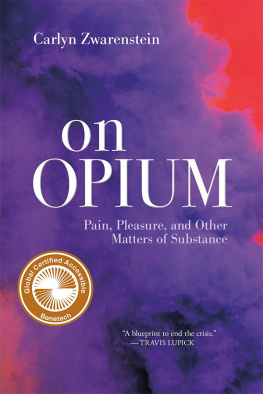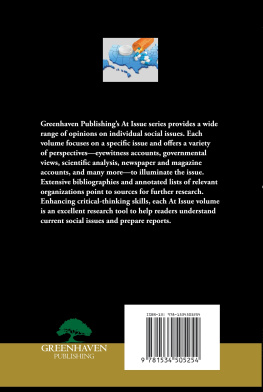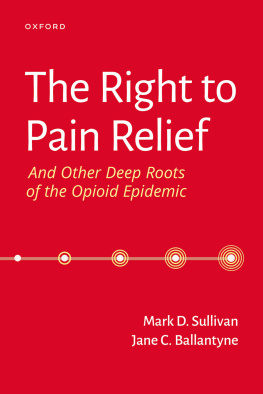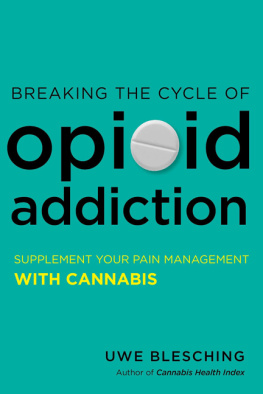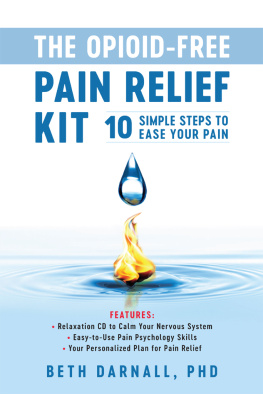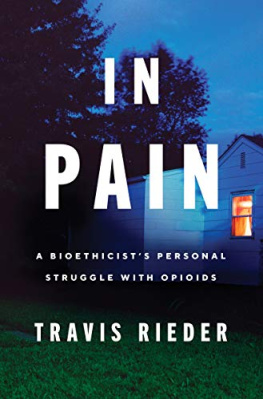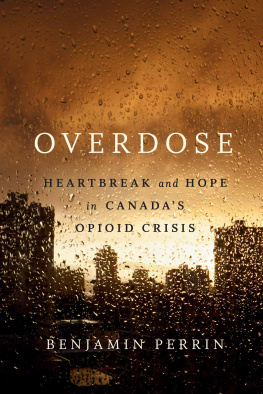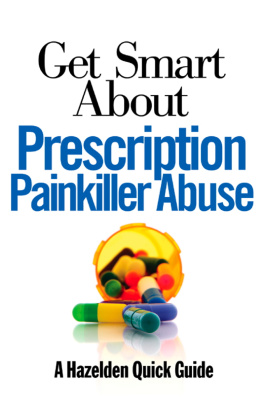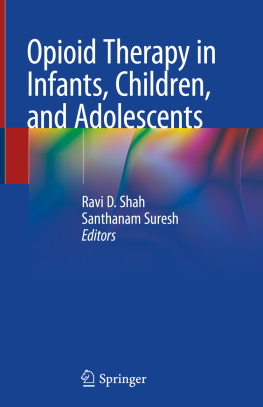Table of Contents
List of Pages
Landmarks

Carlyn Zwarenstein provides a voice previously missing from the overdose crisis. With empathy and urgency, she takes us inside the world of people who use opioids at a time when they are dying in record numbers. On Opium captures peoples pain, hope, and resilience, and in sharing their stories, provides a blueprint to end the crisis.
Travis Lupick, author of Fighting for Space: How a Group of Drug Users Transformed One Citys Struggle with Addiction
A beautifully written meditation on opioids, addiction, joy, and pain and the cruel and rigid policies we devise that mainly serve to make suffering worse.
Maia Szalavitz, author of Undoing Drugs: The Untold Story of Harm Reduction and the Future of Addiction
Zwarenstein not only plumbs the depths of pain and relief and dependence on relief but traces the blurred lines between writer and subject on that perhaps needlessly charged question: What do we do for pain and its wily life-thieving-or-enabling remedy? What would happen if we turned our focus to the prevention and elimination of suffering, rather than the demonization and criminalization of sufferers?
Anna Mehler Paperny, author of Hello I Want to Die Please Fix Me: Depression in the First Person
Also by CARLYN ZWARENSTEIN
Opium Eater: The New Confessions
Carlyn Zwarenstein
ON OPIUM
Pain, Pleasure, and Other Matters
of Substance
GOOSE LANE EDITIONS
Copyright 2021 by Carlyn Zwarenstein.
All rights reserved. No part of this work may be reproduced or used in any form or by any means, electronic or mechanical, including photocopying, recording, or any retrieval system, without the prior written permission of the publisher or a licence from the Canadian Copyright Licensing Agency (Access Copyright). To contact Access Copyright, visit accesscopyright.ca or call 1-800-893-5777.
Edited by Linda Pruessen.
Not Waving But Drowning (four-line excerpt) by Stevie Smith, from Collected Poems of Stevie Smith, copyright 1957 by Stevie Smith. Reprinted by permission of New Directions Publishing Corp.
Cover, page design, and graphic elements by Julie Scriver.
Cover image: Electro Parade from Montreal, August 2017 by Camille Couvez, unsplash.com
Goose Lane Editions acknowledges the generous support of the Government of Canada, the Canada Council for the Arts, and the Government of New Brunswick.
Goose Lane Editions
500 Beaverbrook Court, Suite 330
Fredericton, New Brunswick
CANADA E3B 5X4
gooselane.com
Library and Archives Canada Cataloguing in Publication
Title: On opium : pain, pleasure, and other matters of substance / Carlyn Zwarenstein.
Names: Zwarenstein, Carlyn, author.
Description: Includes bibliographical references.
Identifiers: Canadiana (print) 20210178817 | Canadiana (ebook) 20210178841 | ISBN 9781773101811 (softcover) | ISBN 9781773101828 (EPUB)
Subjects: LCSH: Opioids. | LCSH: Opioid abuse. | LCSH: Substance abuse. | LCSH: PainTreatment.
Classification: LCC RC568.O45 Z93 2021 | DDC 362.29/3dc23
To the family I depend upon, and who can depend on me Zwarenstein, Levin, Kitai-Rosenthal, Olmos Hernndez, and friends who are family. With endless love.
In memory of my grandparents, Jack & Esther Levin and Sam & Esther Zwarenstein.
Contents
Prologue
Fall 2020
I first learned of the existence of Michael Eschbach, a fifty-nine-year-old man who has become one of my online friends an internet ghost, he calls himself from posts he made on Twitter in the spring of 2020. I was working on this book at the time, about opioids and what people need that opioids can provide. It was also when SARS-CoV-2 really hit Toronto, when schools shut and we all went into a semi-lockdown as COVID-19 cases rose and rose, with opioid overdose deaths surging soon after as drug supplies were interrupted, social services shut down, and isolation exacerbated.
At the time, Michael was living at St. Simons, a mens-only homeless shelter about five kilometres from my apartment. With increasing desperation, he wrote to whoever would listen that infection was inevitable in the shelter due to crowding and the failure of staff to enforce physical distancing. Never mind that COVID-19 was initially spread by those with the means to travel: the pandemic quickly found its way into the endothelia of the working class, the poor, and the most deeply marginalized. In vain, Michael begged the city to move older men like him out and into permanent housing. Eventually he posted a clandestinely filmed video of the closely spaced cots. A couple of weeks later, the city did move him not into housing, but into a hotel for men who tested positive at the shelter.
Now, after spending two lonely weeks at the quarantine hotel, Michael has been moved again. The City of Toronto has relocated him to another hotel, this one near Torontos international airport. Here he lives a surreal existence as he deals with persistent post-viral symptoms that arose after he was released from quarantine.
Michael uses a cane due to a bad knee and degenerative disk disease. He is prescribed morphine as well as pregabalin to cover the pain, which otherwise keeps him up at night and renders him suicidal. When he was moved from the quarantine hotel to the shelter hotel, no one bothered to fax his prescription. So he hobbled in pain the one kilometre to the pharmacy in an attempt to sort it out. Its horrible. You question the point of existence, he wrote me about the agony he experienced while still waiting for the doctor and pharmacy to communicate, all attempts halted over the weekend.
I send him a copy of my first book, a slim meditation about pain, and while he waits for it the postal service having slowed to nearly a halt during COVID, even though his hotel must be less than twenty-five kilometres from my apartment he puts on his mask and goes down to the lobby every day to check the mail. Just like in those old black-and-white movies where the hero or heroine checks with the hotel clerk for secret messages, he says.
Even if youre not living what Michael calls an ethereal existence in a hotel in the middle of nowhere, near nothing but the airport which promises an escape you cant take anyway it is the strangest summer in living memory, this COVID summer of 2020. Like most of the world, really, I too am trapped.
There are many ways to be trapped: by poverty, by responsibility, by delusions, by racism, by depression, by loneliness, by pride. I have felt trapped since my body began to turn against me many years ago, when I first started to suffer the intense joint stiffness and accompanying pain that would turn out to be a degenerative spine disease, with symptoms that are temporarily relieved by exercise and which worsen with rest. My joints are joints the way a prison is a joint. They force me to dramatize my lifelong love of travel by being unable to stop moving, no matter how weary I get. And yet travel itself hours in a car, in a plane, standing in line is almost impossible like this. For years now I have thought obsessively about freedom of movement, about psychological escape.
Since childhood, books have opened their departure terminals to other realities for me. For those who are trapped or lonely, theres no better escape, if you can concentrate on it. Its no wonder that, as Michael tells me when he says its okay for me to share his words and his story here, One thing I learned while I am homeless is this: no matter our condition, be it mental illness, or marital issues, or diagnosed ailments, or undiagnosed, or we simply fell through all the cracks, all of us read voraciously.

